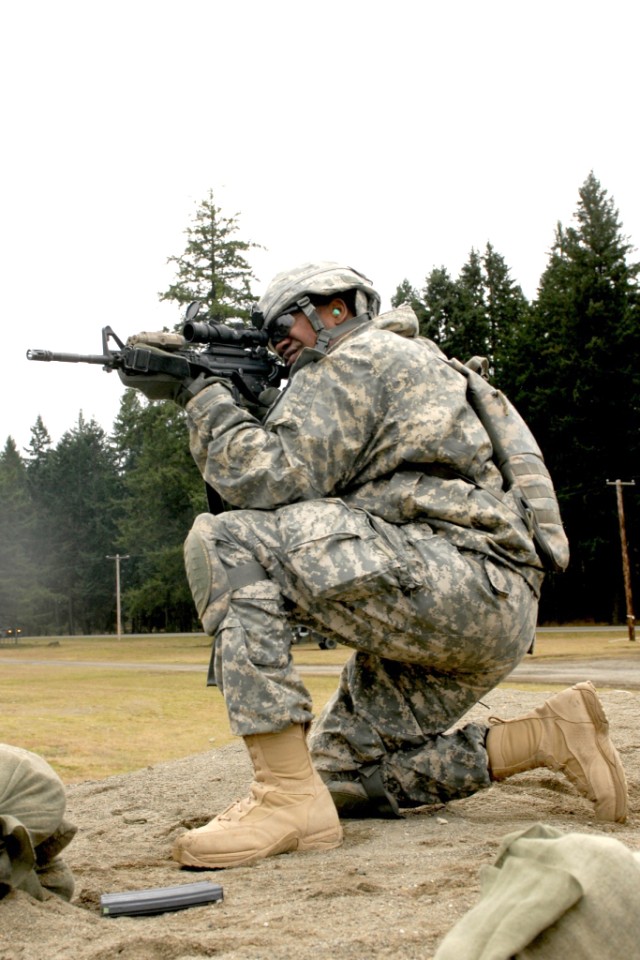When Sgt. 1st Class Jose Weeks came to work Feb. 2, a small manila envelope with no return address was waiting for him.
It was a letter from Maj. Gen. David Halverson, the commanding general of the United States Fires Center of Excellence and Fort Sill, notifying the platoon sergeant with B Battery, 2nd Battalion, 12th Field Artillery Regiment he had won the 2010 Gruber Award as the best field artilleryman in the Army.
It is named after Brig. Gen. Edmund L. Gruber, 1879-1941, who, as a first lieutenant in 1908, composed the "Caisson Song" that the Army adapted as "The Army Goes Rolling Along" in 1952.
"I was very excited," Weeks said. "I can't describe the emotions."
The Panama City, Panama native said he had no idea he had been nominated by his leaders until he received an e-mail a few weeks before naming him as one of three finalists for the award.
The Gruber Award was established in 2002 to recognize outstanding individuals who represent excellence among field artillerymen, said Weeks' battalion commander, Lt. Col. Terrence Braley.
"Sergeant First Class Weeks is an adaptable, flexible leader and a master artilleryman," Braley said. "He can move from doing his core competencies to firing battery platoon sergeant ... to conducting crew drills on the M-777 to the next day doing a presence patrol or a counter-(indirect fire) or -IED patrol without skipping a beat."
Braley said he submitted the nomination months in advance so it wouldn't be lost during the brigade's redeployment and block leave.
It was Weeks' leadership, mentorship and actions during deployment with 4th Brigade., 2nd Infantry Division that contributed to his winning the award. His work with the Iraqi Security Forces was recognized, and his execution of his platoon's medical evacuation and casualty evacuation procedures directly saved the life of one of his Soldiers.
"I remember that day very vividly," Weeks said, recalling July 14, 2010, when his convoy came under attack.
"We were actually doing one of the last patrols (of the deployment)," Weeks said. "(It was) a right-seat ride with the incoming unit and showing them around the area."
As the patrol headed back to its base, the lead vehicle was struck by an explosively-formed projectile that ripped through the body of one of the Soldiers inside, leaving a trail of shrapnel down his lower back and through his legs.
"As soon as we got hit, we called to find out if anyone was injured," Weeks said.
The convoy pushed through the kill zone to a secure area and continued first aid on the injured Soldier.
Weeks said he remembered the medic jumping into the vehicle to provide further aid to the casualty. The Soldiers inside the damaged vehicle had already initiated care and had applied a tourniquet to the wounded Soldier's leg, something on which Weeks had repeatedly drilled his Soldiers.
"We always rehearsed everything we would do ... if the lead vehicle gets hit or the second vehicle gets hit," Weeks said. "It just so happened that the lead vehicle got hit."
Weeks and his Soldiers immediately drove the injured Soldier to the closest hospital at Victory Base Complex instead of waiting for a medevac helicopter.
"In the worst times there was a sense of camaraderie within the platoon," Weeks said. "Everybody was working toward one goal, which was taking care of the Soldier."
His Soldiers' rapid response that day showed Weeks that he had done a good job of training them, the primary reason Weeks won the Gruber Award.
However, the accolades from his peers and leaders meant the most to him.
"Just the fact that people around you recognize the hard work that you put into your work makes you feel great," Weeks said. "To be recognized at that level among all my brethren in the field artillery really makes me feel excited and humble at the same time."
It wasn't only his fellow field artillerymen who were proud of him. A key figure behind the scenes, Weeks' wife Doris, said she was pleasantly surprised upon hearing her husband had won.
"I was very happy for him," Doris said. "We didn't even know he was being considered."
While Weeks was deployed, Doris took care of their four children, including a set of triplets, along with the rest of the household duties.
"I think all military wives play a big part in all of it," she said.
She was impressed when she learned what the award meant.
"I'm so proud of him and his accomplishments. I think he really deserves it," she said. "He loves his job and loves being a Soldier."
Weeks said winning the award makes him want to keep working hard, providing guidance and setting a good example for his Soldiers.
"The main thing that I always try to do is just do my job to the best of my ability and make sure that those around me get better at what they do."


Social Sharing